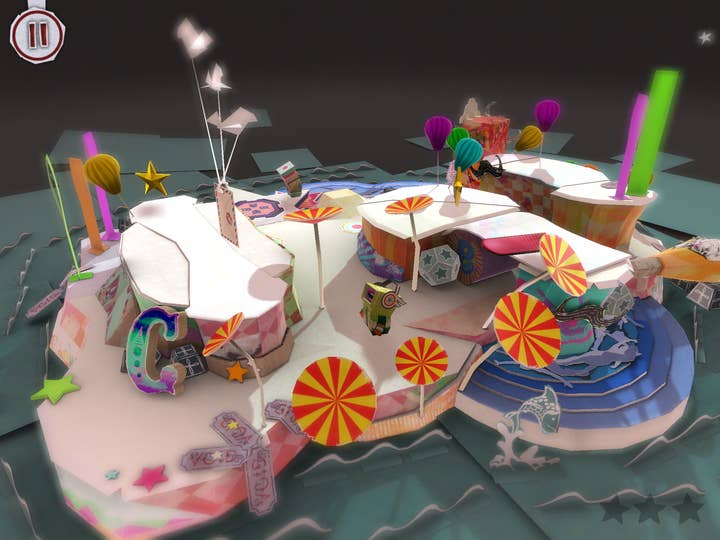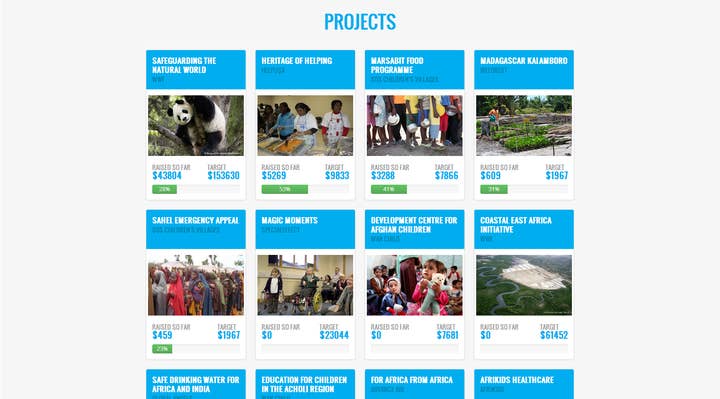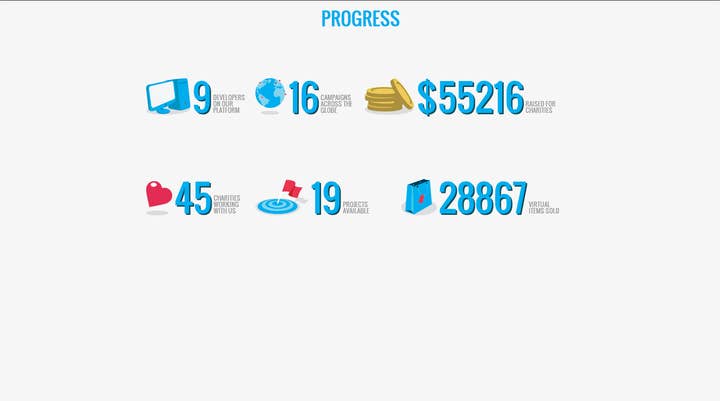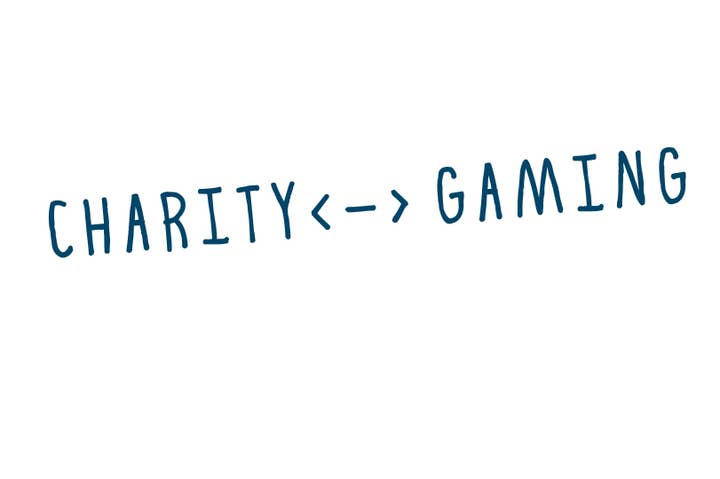How to Gamify Giving: Playmob's new model for charity
"There's literally no downside for anybody involved."
Charity and gaming are, thankfully, becoming increasingly comfortable bedfellows. From the Humble Indie Bundles, through Special Effect, Child's Play and GamesAid, right down to the plucky individuals subjecting themselves to 24 hours straight of adolescent abuse by entering all-day COD marathons, the estimated seven billion hours of game-playing enjoyed every year are forever finding new ways of contributing to good causes.
The only problem is, or has been, that at some point along the line these mechanisms require people to put their hands in their pockets. Now, gamers are no less generous a bunch than any other global community, on the whole, but when you've already paid once for an experience it doesn't necessarily encourage you to dig deep to make a donation on top.
Developer turned one-stop philanthropy-shop PlayMob has been working in the centre of the charity/gaming Venn diagram for a few years now. Up to date, the company has worked with the idea of selling in-game items to raise money: buy, for example, a baby panda in-game, and real world money goes to the WWF. Players buy more, earning more for developers, but also contribute to a charity. Because PlayMob has standing agreements with major charities it can cut through the red tape surrounding becoming an official charity sponsor and set up partnerships with minimum fuss.
That model is a successful, and fairly standard, way for gamers to give something back. Now, however, the Ian Livingstone-chaired PlayMob thinks it has hit upon a scheme which will see gamers earning money for worthy endeavours simply by enjoying themselves - with the cash coming straight from the generous budgets of multi-national corporations.

Not only that, CEO and co-founder Jude Ower thinks that the API for the new system can be implemented into almost any game with virtually no effort at all.
"We actually started off as a studio, so we were building games for training, education and social impact," Ower tells me. "So we were working on corporate training games with people like Shell, the Houses of Parliament, Futurelab, Nesta and so on. It was a couple of years into running the studio that the charities started to get in touch and ask if we could make a game that taught people about their causes but made money at the same time.
"So we were working on this when Zynga released a campaign for the Haiti earthquake which was the Sweet Seeds campaign. If you purchased a virtual seed then a portion of those proceeds would go to helping the victims of the actual earthquake. They managed to raise $1.5 million in five days, which made a huge impact for the people who needed money quickly, but also, digging deeper into the campaign, the business reasons were that they were seeing an 80 per cent conversion from non-spender to spender. A huge conversion - partly because it was a quick reaction to a situation.
"So this was what spun the idea - if we were to build a platform which would allow every single game studio and publisher to run a campaign quickly then we could make more of this happen. Not only raising money for good causes, but also letting developers see the business benefits of doing it as well. Increasing conversion, players spending more money and more time in a game and increasing the lifetime value of a player."
"Digging deeper into the campaign, the business reasons were that they were seeing an 80 per cent conversion from non-spender to spender"
PlayMob CEO Jude Ower on Zynga's campaign for Haitian earthquake victims
This idea turned into the reality of Play Coins - virtual tokens which are awarded to players for what amounts to micro-achievements. Finish a level, beat a time, collect X of Y etc. Each time a player gets a coin, they can decide which charity receives it. And best of all? The cash which actually gets donated comes from a corporate sponsor.
"Brands can sponsor the coins, so they become the direct funder of that donation - that's where the cash comes from," Ower continues. "What we're trying to do with the coins is to give developers another option. You can do something via an in-app purchase in the game, which can equal a donation or a coin itself, or have coins as a reward for actions. With coins, the player can decide where the donation will go - the coins aren't tied to a particular charity, they're sort of like the Waitrose green coin system.
"So what we do is break down charities into projects, and each project has an amount it wants to raise. Players can then drop a coin into one of those projects. Players and games can both have default projects for donations, too. That coin system is going to lead to players seeking out games where they can earn coins, hopefully seeing people rallying around those games that are offering support. Developers can choose either or a mixture of the two."
John Nash, studio design director at Blitz Games is a total convert, sometimes evangelising the idea even more raptly than Ower does. As the first partner for the new Coin system, which will be debuted in the publisher's iOS hit Paper Titans, Blitz clearly has some vested interest in seeing the pilot succeed, but it's quickly obvious that Nash's engagement is far from self-motivated.

"We've got our own serious games division and we've also worked on several other projects which haven't come to light which were in a very similar space," Nash tells me. "So the opportunity to work at that level again with another partner was obviously hugely exciting to us. All of us, from the oldest hands in the industry to the newest ones, really believe that engaging gamers and the billions of hours that they pour into video games, finding a way to tap into that passion to drive change lies at the heart of what we're trying to achieve here. From the studio's point of view, getting involved early on in a project like this is exciting because it lets us really engage with that project and cause."
Nash might be feeling philanthropic, but there's clear business reasoning behind the choice, too.
"From a purely business point of view, that players will be converting from non-spending to spending players is something that we'd definitely benefit from. Also we expect growing networks of people to share games experiences. People who start to play for causes will start to propagate between games, there's a viral marketing aspect to it as well.
"From our perspective it hits three things. One, we get to do that thing that we've always wanted to do, which was to effect change by using our game as a place to be; two, boosting our conversion rate across the board; three there's a massive cross-promotional potential as well. But the things that really drives us is that, whichever way you look at it, the biggest beneficiary is going to be the charity because there's going to be a completely new revenue stream for them. So it's quite hard to actually see any downside. It promises to be something pretty special."
"If you look at the data points that we've measured so far, the average has been a five times increase in spend across the various campaigns which we've run"
I ask Ower to clarify what sort of boost free-to-play companies can expect to see by implementing both the coin-based and charity item systems, as well as how much cash she sees it generating for the beneficiaries. Her answers are almost incredible.
"If you look at the data points that we've measured so far, the average has been a five times increase in spend across the various campaigns which we've run. We've also seen a third of the players who've participated in a campaign playing and spending outside of that campaign. So in terms of increased spend and lifetime value of a player, that's a big increase.
"It's a win-win. The player doesn't spend money because the coins are being paid for, the developer increases player engagement and lifetime value as well as attracting new players, and brands can spend their CSR budgets appropriately.
"The ultimate target for us is that of raising $1 billion for charity over the next three years."
Raising over a billion for charities is a laudably ambitious aim, but I suspect it may be the other figure which is catching the eyes of developer and publishers. Can boosting income by this incredible amount really be so simple? According to Nash, it's been a breeze.

"That's been one of the nicest things about working with PlayMob - the integration is very straightforward. From a technical aspect it's just a case of implementing the API, and that takes maybe a couple of days for an existing game. In the big scheme of things that integration is actually pretty trivial. We'll be working with the tech guys to make sure that's as smooth a process as possible because it's obviously a perceived difficulty as overhead, but it's very easy overall.
"The actual mechanisms, which Jude touched on, are also pretty straightforward. There's the virtual item, which just needs people to agree on the item and the cost before it goes in. The coin system is actually where we're going to have a lot more fun when we integrate it into the games. It could be as simple as complete a level, do something in a time limit, find an item. They can all be effectively sponsored by a PlayMob coin. So from a game design point of view it's actually very creative - it's not limited at all by technology, just by the imagination of whoever is designing the game. So for a designer its a piece of cake and a real joy to work with.
"We're really just scratching the surface, because we're only talking about achievements for individual games. We can talk about achievements across IPs or multiplayer, suddenly you massively multiply the opportunity to engage people with your game but also to turn all that effort into money which most of the time wont have cost the player anything but time, which they're enjoying anyway."
Ower tells me that the Coin system is remarkably configurable, with a choice of causes and sponsors which can be assigned to specific games, giving players the choice of up to five. If a player doesn't bank them, coins are donated to a 'default' cause for a game rather than gathering dust. Brands can also get some exposure, and a little PR kickback to justify the CSR budget to the board, by sponsoring games or coin awards related to their causes.
"The ultimate target for us is that of raising $1 billion for charity over the next three years"
It all sounds, I tell Ower and Nash, a little too good to be true. I tend to err on the side of careful cynicism in most things, but surely there must have been some resistance from charitable causes who have heard all the promises before.
"Charities know now that they need to innovate to be able to fundraise," Ower counters. "In the UK alone donations went down by about £1bn last year. During budget cuts and austerity measures direct- debit donations are among the first thing to go and that's where charities had made a lot of money before. Plus, traditional charities had often relied on estates being left to them. People are now living longer and spending more before they die, so charities are having to think out of the box. So we've done a lot of education on the charity side to explain what this means to them.
"What we find is that small and medium sized charities are a lot more nimble and quick. There's still a process to go through with legal work, which even with smaller charities can be a long process, but that's the bit we take on. With bigger charities you need to secure brand licences in order to support them and I think things like that are going to be much slower to change.
"But there's an appetite out there, among the big ones. Now we've worked with WWF and Charity Water, some of the big names, a lot of the other charities follow suit. It's great to have those big charities as a case study to show the others that this is OK. There's a large charity I met with last week; they've got their funding strategies sorted for all the different industries and corporate partners but gaming is still a big question mark - they don't know how to engage with the games industry. Some of them have tried to build their own games for specific charities, but it hasn't been very successful because people don't necessarily want to play charity games, they want games with charity aspects.
"The next pitches we do for Xbox One and PS4, which we're currently working on now, this system will be a part of those pitches"
Blitz Studio Design Director John Nash on future plans for Play Coins.
"So I think they're starting to switch on and become innovative, we'll see some of the big ones get involved with this, for sure."
As for partners on the gaming side of the deal, PlayMob couldn't have asked for someone much more voluble than Nash and Blitz. As far as Nash is concerned, the Play Coin system is here to stay.
"Well as it stands at the moment, even from the initial signs of how easy it was to integrate and our excitement for the system, I'm already making sure that our next free-to-play game, which is going through greenlight at the moment, already has it included in the plan from day one. We might even be able to build this into the DNA of the game mechanics.
"Even without that, even just with the in-app purchasing and the Coin system, we're almost certainly going to be putting this into all of our titles going forward, because there's absolutely no reason not to. There's literally no downside for anybody involved. It's a part of what we do going forward and we're very excited to be part of it.
"The next pitches we do for Xbox One and PS4, which we're currently working on now, this system will be a part of those pitches. If you listen to people like Phil Harrison, the direction that the big platforms are going to be taking is that they're very heavily going to be targeting free-to-play going forward anyway. So the model fits, the platform fits, all of those platforms are going to have digital stores, all of the mechanisms necessary.
"This is one of the other big advantages of using PlayMob as a developer - if it gets to the point where they have an agreement with Sony, Nintendo or Microsoft, that might get rid of a lot of paperwork and red tape for individual developers looking to get involved with that system. It's much easier for one company to get that agreement in place and then provide that as a service. The second that goes into place, I think you'll see this in all of the top-end games."
"We're super-excited to be partnering with Blitz," says Ower, only semi-contractually. "I've always admired it as a company because it's always been so innovative and keen to try new things, so they're a great partner to have. We're really looking forward to seeing if we can roll it out to all of their games and start cross-promoting.
"Our plans are that we see this as being very platform agnostic, being able to roll out everywhere. Mobile and free-to-play are sensible places to start, but we've worked in MMO before and to take it to consoles as well would be a great step, especially the new generation. They're a nice fit. Looking at your Xbox account, you've got your avatar that you can purchase various customisation elements for. If you could buy charitable customisations, I think that would be great.
"I see games as going in the direction of being cross-platform and that's why we believe that this should be across multiple devices rather than platform specific."
For Nash, the vision is perhaps even wider. By making this an option, to gamify the act of giving itself without asking anything more of the player than the time they were already giving of their own accord anyway, PlayMob can turn the industry into a poster-child for a new model of charity support, earning it a much-needed PR boost at the same time.
"It's beyond me why the billions of hours of gaming haven't been harnessed for good causes and I think we're about to drop the mechanism that makes that possible into the world," Nash concludes. "When that happens, the really big story here is that the games industry as a wider mechanism, as a media platform, is going to get a really positive message to push out there."









